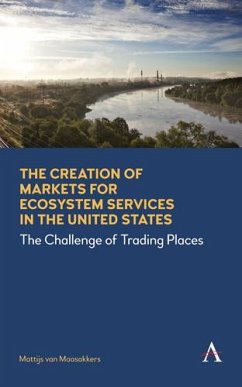The Creation of Markets for Ecosystem Services in the United States is a detailed, critical analysis of the most advanced efforts to create ecosystem services markets in the United States. With the help of in-depth case studies of three well-known attempts to create such markets--in the Chesapeake Bay watershed, the Ohio River basin and the Willamette River basin--the book explains why very few of these markets have actually succeeded even after close to two decades of much scholarly enthusiasm, significant federal funding and concerted efforts by NGOs, government agencies and private businesses.
Based on interviews, policy analysis and participatory observation, three features of markets for ecosystem services emerge as particularly problematic. First, the logic of displacement or the idea that particular elements of an ecosystem can be separated, quantified and traded across landscapes or watersheds runs counter to political interests, environmental beliefs and people's connections to specific places. The second problem is that of measurement. By highlighting the long and often contentious histories of specific measurement systems used in ecosystem services markets, van Maasakkers shows that these quantification methods embed a range of assumptions and decisions about what counts when conserving or restoring (parts of) ecosystems. The third problem is related to participation in environmental decision-making. Since the requirements to buy offsets stem from federal and sometimes state regulations (based on the Clean Water Act or the Endangered Species Act), the opportunities and requirements for public participation are much more in line with typical policy implementation processes as opposed to voluntary decisions about buying and selling in an ideal typical market. How meaningful participation in this hybrid form of regulatory market is possible is not clear and not something that the proponents of markets have successfully dealt with, if at all.
Based on interviews, policy analysis and participatory observation, three features of markets for ecosystem services emerge as particularly problematic. First, the logic of displacement or the idea that particular elements of an ecosystem can be separated, quantified and traded across landscapes or watersheds runs counter to political interests, environmental beliefs and people's connections to specific places. The second problem is that of measurement. By highlighting the long and often contentious histories of specific measurement systems used in ecosystem services markets, van Maasakkers shows that these quantification methods embed a range of assumptions and decisions about what counts when conserving or restoring (parts of) ecosystems. The third problem is related to participation in environmental decision-making. Since the requirements to buy offsets stem from federal and sometimes state regulations (based on the Clean Water Act or the Endangered Species Act), the opportunities and requirements for public participation are much more in line with typical policy implementation processes as opposed to voluntary decisions about buying and selling in an ideal typical market. How meaningful participation in this hybrid form of regulatory market is possible is not clear and not something that the proponents of markets have successfully dealt with, if at all.
Dieser Download kann aus rechtlichen Gründen nur mit Rechnungsadresse in A, D ausgeliefert werden.









